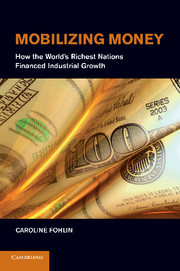5 - Financing Industrial Investment
Published online by Cambridge University Press: 05 January 2012
Summary
The historical and theoretical literatures offer many hypotheses about the potential advantages of corporate banking systems that provide a wide scope of services and build formal relationships with clients, particularly through bank positions on the boards of nonfinancial firms. From a theoretical perspective, the existence of relationship banking may affect firm financing in myriad ways, from access to and costs of capital to their growth, profitability, and even their survival.
Institutions that facilitate access to information about firms or ameliorate conflicts of interest between investors and entrepreneurs may temper the problems that lead to inefficient financing decisions. In the older historical literature, universal banks are seen as such an institution, the idea being that they resolve problems of moral hazard (improper or suboptimal use of funds) on the part of firms and conflicts of interest between equity holders and debt holders. It is also plausible, at least on the surface, that the integration of universal and relationship-based corporate finance gives some firms greater access to external finance and may alter their decisions (perhaps even unwillingly) about the various sources of funds to tap as they grow and mature.
- Type
- Chapter
- Information
- Mobilizing MoneyHow the World's Richest Nations Financed Industrial Growth, pp. 112 - 136Publisher: Cambridge University PressPrint publication year: 2011

